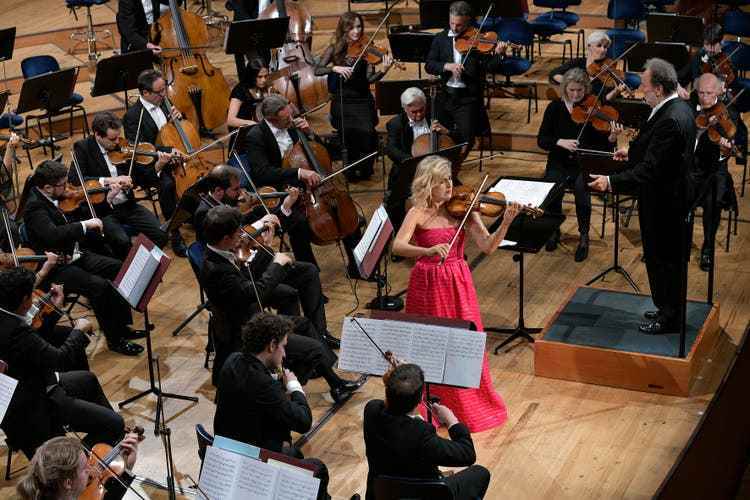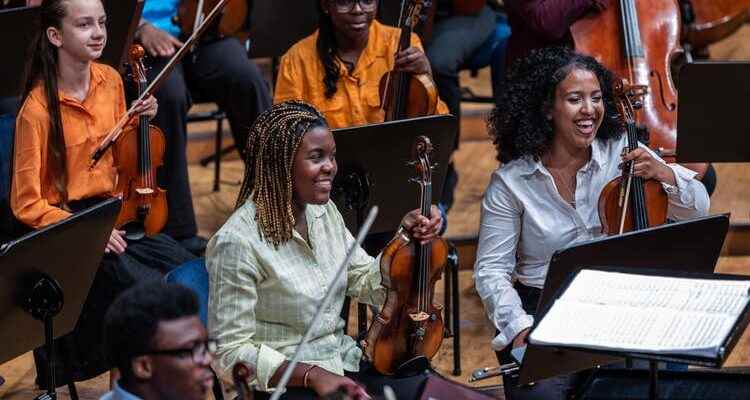The concert summer in Lucerne is all about “diversity” – a politically and artistically sensitive motto, as the festival opening at the weekend shows.
Members of the «Chineke!» youth orchestra during their performance at the KKL Luzern.
Something is different this time. There’s a special orchestra up there on the stage in Lucerne’s Culture and Congress Center. A lot of very young people play it, most of them well under twenty. A wonderful tension spreads, many of the young musicians are visibly suffering from stage fright – no wonder, after all, this evening is not just about music, but about a statement.
The «Chineke!» Junior Orchestra, which performed on Tuesday in the Lucerne Festival’s meritorious youth orchestra series, is almost entirely composed of people of black, Asian or multiracial origin. This is actually anything but normal. Because to this day, whites form a clear, if not to say overwhelming, majority in all European and North American professional orchestras.
Listen, that’s the message from «Chineke!», we play the familiar music with the same rights and the same high standards, and we’ll bring you a few more pieces that you don’t know because their composers have had a hard time up to now , to be heard in the music world, just like us. Changing this state of affairs fundamentally – that is also the concern of the Lucerne Summer Festival 2022. It has therefore placed its program under the dazzling motto “Diversity”.
“Living Diversity”
Michael Haefliger, artistic director of Switzerland’s leading concert festival since 1999, sees himself as an “icebreaker” in this commitment to more diversity in music. The ice that needs to be broken is obvious: It’s about equal opportunities and about breaking up questionable customs and power structures in the classical music business in order to ideally enable all social groups to participate in culture, not least as a professional field of activity for young musicians musicians from all over the world. Up to this point, the matter should be undisputed, especially against the background of globalization, which is progressing unchecked.
The challenges for the cultural sector begin where you have to define which hitherto disadvantaged groups should be addressed. In Lucerne, the role of women, who are still underrepresented in the music world, was already being addressed in 2016. This summer, the focus is on the so-called people of color. In many places, their share in classical ensembles is less than one percent, including in Switzerland. There is no question that this hardly reflects the composition of most European societies today.
It becomes controversial as soon as the analysis is to be followed by action. Even the coinage “People of Color”, in the broadest sense a collective term for all “non-white” people, which has not yet been convincingly translated into German, is controversial and by no means neutral; it shows how close the border to activism is here. Haefliger does not dispute that, although he wants to avoid any “foaming at the mouth” on the subject, as he said in an interview with the NZZ, he is still leaning out the window with the “diversity” motto politically more than ever. This is also underlined by the invitation to Chi-chi Nwanoku, who gave a passionate speech at the opening of the festival on Friday evening.
The founder of the two diverse «Chineke!» orchestras – the second ensemble of up-and-coming professional musicians will close the festival on September 11 – is a true activist and also a key figure in the music scene in her home country of Great Britain. The trained double bass player with Irish and Nigerian roots uses her own painful experience – but now even with the goodwill of the Queen – to ensure that the music ensembles become more of a reflection of the multi-ethnic society in the kingdom. Nwanoku criticizes, among other things, disadvantages in the practice of filling orchestra positions. However, the fundamental question of whether the Anglo-Saxon conditions can be transferred to the situation in Switzerland and what would have to follow from this in concrete terms remains unanswered.
Here there is also a notable contradiction to the greeting of the Swiss Federal President. Ignazio Cassis conspicuously avoids the politically charged term “diversity”, preferring to talk about diversity without – like Nwanoku and the festival – narrowing it down to the topic of skin color. “It is the diversity practiced in this country that makes us what we are,” says Cassis, calling Switzerland a “small orchestra”. This doesn’t work because “the screamer prevails”, but because “we also listen to the quiet tones”. Polyphony requires a constant struggle for harmony here and there.
rescue mission
Did Cassis have the first piece of the following concert program in his head? In any case, Wolfgang Rihm’s “Transformation 4”, which was played on the occasion of the 70th birthday of the Lucerne Academy director, almost seemed like an ironic comment on the diplomatic words. The orchestral work from 2008 actually breaks into the listener with powerful gestures and extremely many voices. But the longing for superficial harmony is stubbornly resisted by this richly formed musical hidden object. That was a good thing, because there was plenty of catchy harmonics afterwards.

Violinist Anne-Sophie Mutter will play Joseph Bologne’s Violin Concerto in A major with the Lucerne Festival Orchestra conducted by Riccardo Chailly on Friday.
In order to do justice to the motto of the season, Joseph Bologne’s Violin Concerto op. 5 No. 2 was on the program on Friday. The Chevalier de Saint-Georges, born in Guadeloupe, has gone down in music history as a competitor of Mozart, even as “le Mozart noir” – a somewhat grandiose comparison. The stylistic proximity to his early violin concertos, also written around 1775, is unmistakable, but Bologne’s thematic inventiveness lags far behind. Only in the middle movement, a magical nocturne, do the two contemporaries meet at eye level. Here, the technically not completely sovereign soloist Anne-Sophie Mutter finds perfect harmony with the Lucerne Festival Orchestra.
Its chief conductor Riccardo Chailly only seems to be in his element during the second part of the concert. Here he continues his Rachmaninoff cycle, which he began in 2019, with the 2nd symphony; at the repeat on Saturday, instead of the works by Rihm and Bologne, there will also be the popular 2nd Piano Concerto with the outstanding young Japanese Mao Fujita to the performance. It has absolutely nothing to do with the festival motto. The salvation intended by Chailly for the supposed kitsch Rachmaninoff succeeds splendidly.
Chailly shows how this palatable, over-opulent music can be given almost the formal unity, even the power of a Beethoven symphony, with attention to detail and superior control. Nothing is sobbing and dripping, but Chailly and his outstanding musicians are noticeably burning for their rescue mission. This is activism that does not require any political justification.
